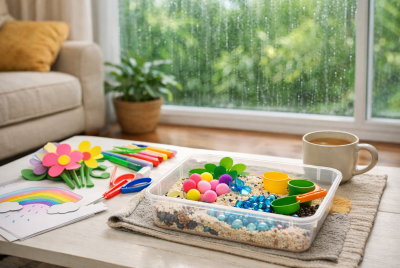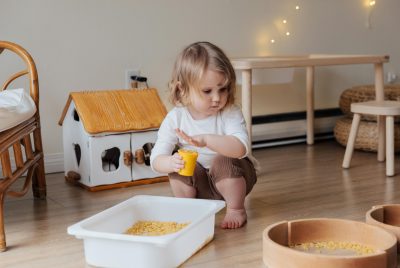Parents as Teachers: The Real MVPs of Everyday Learning
We may earn a commission for purchases made using our links. Please see our disclosure to learn more.
Hi there! Let’s discuss a topic we frequently ignore: parents serving as teachers. Have you ever considered how much we parents truly teach our children every day? We’re always molding their little brains, from tying shoelaces to determining why the sky is blue (thank you, incessant “why” queries!). And you know what? To be a great teacher, you don’t need a degree. So grab a cup of coffee, take a seat, and let’s talk about why parents are the best teachers.
What Does It Really Mean to Be a Parent-Teacher?
First off, being a parent-teacher doesn’t mean turning your living room into a classroom or suddenly becoming a walking encyclopedia. (Although, kudos if you’ve got random trivia down!) It’s about being your child’s guide in this big, crazy world. Every “why,” every “how,” every “can I try?” is a chance to teach. Think of it like planting seeds of curiosity, kindness, and know-how that’ll bloom in their own time.
Why Parents Are the Best Teachers (Hands Down)
Let’s face it, nobody knows your child as well as you do. You have witnessed their first movements, heard their first words, and you most likely know exactly when they are going to lose it—typically in the middle of a supermarket, don’t you? You have a superpower because of that close connection: you know how they learn best. Additionally, you’re close enough to them to have a significant influence. Teachers are amazing, but they have to manage more than twenty children. You? You are the learning journey’s MVP.
Teaching Through Everyday Moments
Honestly, the best teaching moments sneak up on you. Cooking dinner? Boom—math lesson (measurements, fractions, and maybe a quick “don’t touch the hot stove” reminder). A walk in the park? Instant science lesson about plants and bugs. Kids ask so many questions, and while you might not always have the answers (hello, Google!), just exploring those questions together teaches them critical thinking.
Actions Speak Louder Than Words
Let’s face it—kids are sponges, and they soak up everything you do. Want them to be kind? Show kindness. Want them to love reading? Crack open a book yourself. (Even if it’s a guilty-pleasure novel—no judgment here!) The way you act becomes their blueprint for how to navigate the world. It’s a little intimidating, sure, but also empowering.
Creating a Safe Space for Learning
Here’s the deal: kids thrive when they feel safe. That means creating an environment where it’s okay to make mistakes. Encourage their questions, celebrate their efforts, and remind them it’s totally fine to mess up. (Seriously, who gets things right the first time? Not me!) When kids know you’ve got their back, they’ll feel more confident exploring and learning.
Discipline vs. Compassion: Walking the Tightrope
Discipline is important, but let’s keep it real—it’s not always easy to balance that with compassion. You want your kid to follow rules, but you also want them to feel understood. Here’s what I’ve found works: explain the “why” behind rules. Instead of “Don’t do that!” try “If you do that, here’s what could happen.” It teaches responsibility while keeping the vibe positive.
Teaching Values and Life Skills
School covers reading, writing, and arithmetic, but life skills? That’s on us. Honesty, kindness, resilience—they all start at home. Something as simple as assigning chores teaches responsibility. And those heart-to-hearts about feelings? They build emotional intelligence. (Yes, “use your words” isn’t just for toddlers—it’s for all of us.)
Making Learning Fun (Because Who Likes Boring?)
I’ll let you in on a secret: kids learn better when it feels like play. Turn spelling words into a scavenger hunt or use their favorite snacks for math practice. (Who knew multiplication was tastier with chocolate chips?) When learning feels fun, they’ll be all in.
Storytime: The Ultimate Teaching Tool
If there’s one thing kids can’t resist, it’s a good story. Whether it’s a bedtime tale or a funny memory from your childhood, stories teach lessons in a way that sticks. Think about it—who doesn’t remember Aesop’s fables or that one story Grandma used to tell? Plus, sharing stories is such a sweet bonding experience.
Not All Kids Learn the Same Way
Here’s something I had to figure out the hard way—not every kid learns the same way. Some kids need to see it, others need to hear it, and some need to jump in and do it themselves. My advice? Pay attention to what clicks for your child. If they’re a hands-on learner, let them build or experiment. If they’re visual, try diagrams or videos. Tailoring your approach makes a world of difference.
Routines Make Everything Easier
Kids thrive on routines (even if they act like they don’t). Setting aside time for reading, art, or other activities helps them know what to expect—and lets you sneak in teaching moments without feeling overwhelmed. Pro tip: keep it flexible. Life happens, and that’s okay.
Technology: Friend or Frenemy?
Ah, screens—the eternal parenting dilemma. Technology can be a lifesaver when used right. There are tons of educational apps and videos out there. But balance is key. For every hour of screen time, try to include some hands-on or outdoor activity. And don’t forget to join them sometimes—it’s a great way to bond and sneak in a little learning together.
Curiosity: The Best Learning Tool
If there’s one thing kids have in spades, it’s curiosity. Instead of shutting down their endless “whys,” embrace them. (Even when they ask, “Why is the moon following us?” for the hundredth time.) Encourage them to think critically by flipping the script: “Why do you think that happens?” It’s amazing to see where their imagination takes them.
What Happens When It Gets Tough?
Let’s be honest—parenting is hard, and being a parent-teacher can feel overwhelming at times. There will be days when your patience is hanging by a thread, and that’s okay. Nobody has all the answers. (Not even the perfect moms on Instagram, trust me!) Just remind yourself that progress, not perfection, is what matters.
The Joy of Watching Your Kid Grow
One of the coolest things about being a parent-teacher is seeing those lightbulb moments. Whether it’s your kid learning to ride a bike or finally “getting” fractions, those wins are your wins too. It’s a front-row seat to their growth, and honestly, it’s one of the best parts of parenting.
School vs. Home: Bridging the Gap
Just because school handles the formal stuff doesn’t mean learning stops when the bell rings. Ask your kids about their day. Help with homework, and show interest in their projects. When they see you care, it reinforces the importance of education—and strengthens your bond.
Teaching Adaptability for the Real World
The world is changing fast, and our kids need to keep up. Expose them to different experiences, teach them to embrace change, and encourage problem-solving. Being adaptable is like having a Swiss Army knife for life—it prepares them for anything.
Building Resilience (Because Life Isn’t Always Easy)
Let’s face it—life comes with its fair share of bumps. Teaching kids how to handle disappointment and failure is crucial. Share your own setbacks (and how you bounced back), and remind them it’s okay to feel upset. Resilience isn’t about avoiding challenges; it’s about learning to rise above them.
Celebrate Everything, Big or Small
Did your kid finally tie their shoes? Aced their spelling test? Or maybe just managed to pour milk without spilling? Celebrate it! (And yes, cheering “You did it!” in the middle of the kitchen totally counts.) Recognition boosts confidence and motivates them to keep trying.
The Lasting Legacy of Parents as Teachers
Here’s the thing: the lessons you teach now? They stick. You’re not just helping your kid pass a test; you’re shaping the person they’ll become. And while it’s a big responsibility, it’s also an incredible privilege.
Scientific Research Supporting Parents as Teachers
Here are some well-known pieces of research and reviews related to the topic of parents as teachers, hyperlinked to relevant keywords:
- Meta-analysis on Parental Involvement
A meta-analysis by Hill and Tyson (2009) explored the effects of parental involvement on middle school students’ academic success. The study highlighted that academic socialization, such as setting expectations and discussing learning strategies, has the greatest impact on achievement. - Effect of Parental Engagement on Academic Achievement
Lara and Saracostti’s research on parental engagement (2019) demonstrated that active involvement significantly improves children’s academic outcomes. This study underscores the universal importance of parents’ role in education across different cultural contexts. - NCES Report on Family Involvement
The Parent and Family Involvement in Education Report by the National Center for Education Statistics provides an in-depth analysis of how family participation in homework, school events, and discussions correlates with student success.
These studies highlight the significant impact of parents’ involvement in fostering educational and personal growth in children.
Enhancing Home Learning: Recommended Educational Products
To support your role as a parent-teacher, here are some educational products available on Amazon that can enrich your child’s learning experience:
- LeapFrog Learning Friends 100 Words Book
This interactive book introduces children to words in both English and Spanish, enhancing vocabulary and language skills. - ThinkFun Gravity Maze Marble Run Brain Game
A logic-based game that develops spatial reasoning and problem-solving abilities through engaging challenges. - National Geographic Break Open 10 Premium Geodes Kit
This hands-on science kit allows children to discover crystal treasures, fostering a love for geology and exploration. - Sassy Stacks of Circles Stacking Ring STEM Learning Toy
Designed for infants, this toy enhances fine motor skills and introduces basic STEM concepts through stacking fun. - Melissa & Doug PAW Patrol Rescue Mission Wooden Dashboard
Encourages imaginative play and fine motor development as children engage in rescue missions with their favorite PAW Patrol characters.
Incorporating these products into your home can make learning engaging and interactive, reinforcing the concepts you teach daily.
Wrapping It All Up
At the end of the day, you don’t need a teaching certificate to make a difference in your kid’s life. Being present, showing patience, and embracing those little teaching moments are what count. You’ve got this—and your kid is lucky to have you as their first (and forever) teacher.
FAQs
How can I teach my child if I’m not a “teacher” type?
You don’t need formal training to teach. Just use what you know, be curious with them, and make everyday moments count.
What if my kid resists learning from me?
Totally normal! Keep it fun and low-pressure. Turn lessons into games, and remember—it’s a marathon, not a sprint.
Can technology replace me as a teacher?
No way. Technology is a tool, but nothing beats the personal connection and values you provide.
What if I don’t have time to “teach”?
Teaching doesn’t mean extra hours. It’s about weaving lessons into everyday life—like cooking, chatting, or playing together.
**How do I handle my own frustration when teaching gets tough?
Deep breaths! Remind yourself that you’re human, and perfection isn’t the goal. Give yourself grace, and keep going.
So there you have it. Being a parent-teacher isn’t about having all the answers—it’s about showing up, being present, and making the most of every moment. You’re doing great, and your kid thinks so too (even if they don’t always say it). Keep rocking it!




